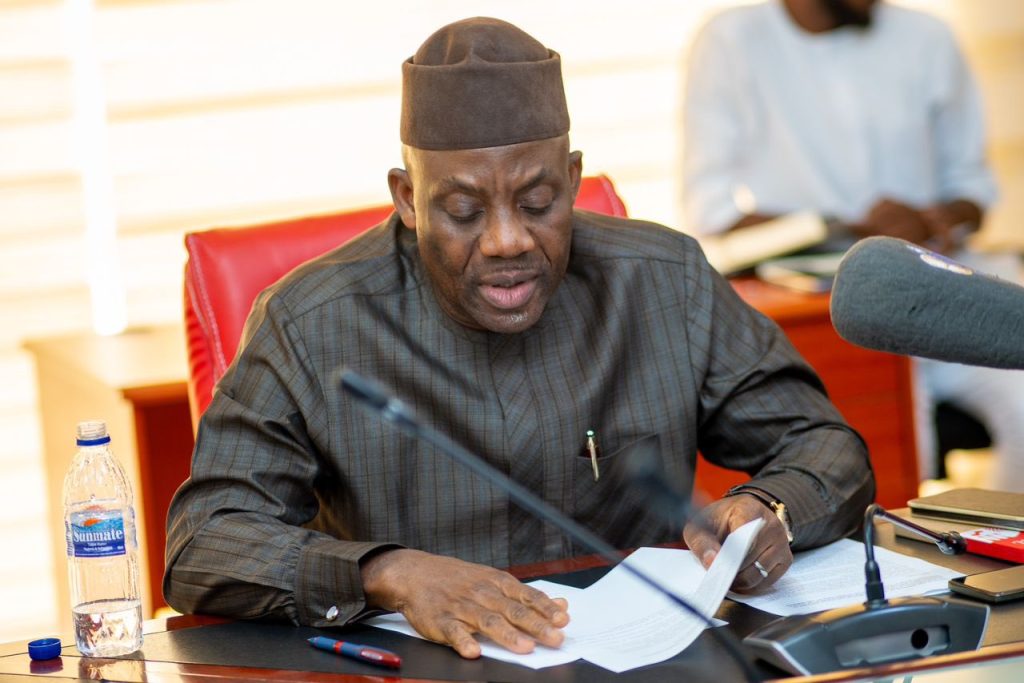In a sweeping proposal aimed at reengineering Nigeria’s national service scheme as a tool for economic empowerment and rural development, the Minister of State for Education, Dr. Olatunji Alausa, has advocated for an extension of the National Youth Service Corps (NYSC) programme from its current one-year duration to two years. This bold suggestion comes alongside plans to significantly enhance the Skill Acquisition and Entrepreneurship Development (SAED) component of the programme, which was originally introduced to tackle graduate unemployment.
Dr. Alausa made the announcement during a visit to the NYSC’s headquarters, where he met with the Director-General of the scheme, Brigadier General Olakunle Akinyemi Nafiu. The minister’s vision was later made public in a statement shared on the official NYSC social media platforms.
A New Direction: From Civic Duty to Job Creation
The central idea behind Dr. Alausa’s proposal is to reorient the NYSC from a purely symbolic national unity initiative into a robust vehicle for job creation, skill development, and grassroots economic stimulation.
According to him, extending the service period would create more space for in-depth technical and entrepreneurial training that reflects the demands of the modern economy. Rather than limiting corps members to a brief orientation and primary assignment, a two-year programme would offer a more immersive experience, equipping participants with the tools to launch careers or small businesses.
He stressed that with more comprehensive training in sectors like digital technology, agriculture, textiles, and manufacturing, graduates could transition from job seekers to employers—solving part of Nigeria’s chronic youth unemployment problem.
Strengthening the SAED Programme
At the heart of the proposed transformation is the expansion of the SAED initiative, which has existed since 2012. SAED was originally designed to empower corps members with practical training in a wide array of vocations. However, critics have long argued that it suffers from poor funding, limited duration, and weak post-service support.
Dr. Alausa’s plan envisions a restructured SAED curriculum that would run continuously through the two-year period. It would offer corps members real-world exposure through apprenticeships, mentorships, and startup incubation initiatives.
This upgrade would ensure that NYSC is not merely a bureaucratic requirement but a strategic launchpad for thousands of young Nigerians into self-employment and innovation-driven sectors.
Tackling the Rural-Urban Skills Gap
Beyond entrepreneurship, the minister highlighted the urgent need to deploy more graduate teachers and professionals to underserved communities. Nigeria’s rural regions face an acute shortage of qualified personnel, particularly in the education sector. By sending more corps members to these areas, the government could address multiple challenges at once—improving rural education, stimulating local economies, and instilling a sense of civic responsibility among youths.
Dr. Alausa called on NYSC leadership to prioritize rural deployment and consider using the scheme as a long-term strategy for reducing regional inequalities in human capital development.
Pushing for Policy Reforms and Inclusivity
In addition to the proposed overhaul of programme content and duration, the minister touched on concerns regarding NYSC eligibility criteria. He pointed out that many graduates—especially those who transitioned from OND part-time programmes to HND full-time studies—remain unfairly excluded from the scheme, despite having completed valid tertiary qualifications.
This statement hints at a broader intention to review NYSC’s regulatory framework, possibly to accommodate a more diverse group of Nigerian graduates and strengthen the inclusiveness of national service.
NYSC Management’s Response: Reform Readiness
In his remarks, Brigadier General Nafiu welcomed the proposals, noting that the NYSC is ready to evolve in alignment with the nation’s changing priorities. He emphasized the scheme’s willingness to comply with future policy directives and expressed support for making it more impactful.
In a complementary suggestion, he proposed the establishment of a centralized database to track Nigerian students studying abroad. This, he said, would serve two purposes: to identify fraudulent foreign certificates and to inform more accurate policymaking.
General Nafiu also noted ongoing internal efforts to restructure NYSC operations to ensure better service delivery and policy compliance.
Transforming NYSC into a Nation-Building Engine
If adopted, the minister’s proposals could redefine the NYSC programme, marking its most profound shift since it was established in 1973 following the Nigerian Civil War. Originally intended to foster national integration and reconciliation, the programme has evolved into a rite of passage for young Nigerian graduates.
However, in the face of economic hardship, mass unemployment, and a widening skills gap, many have questioned the relevance of the NYSC in its current form. Critics argue that too many corps members end up in roles with little professional value—especially in urban centers, where real community engagement is often lacking.
Dr. Alausa’s initiative positions the scheme as a dynamic tool for national economic recovery. By embedding technical training, entrepreneurial incubation, and rural service into its core, the NYSC could become a pipeline for small business creation, youth empowerment, and decentralized development.
Likely Challenges and Public Reaction
While the proposal has sparked fresh optimism in some quarters, it is likely to be met with skepticism in others. Many young Nigerians already struggle with post-graduation uncertainty, and adding another year of mandatory service may be perceived as a delay to starting full-fledged careers, pursuing postgraduate studies, or gaining international work experience.
Furthermore, a longer NYSC programme would require significant government investment. Supporting corps members for two years would mean a substantial increase in budget allocation for housing, monthly stipends, medical care, and infrastructure in remote locations. In a time of fiscal constraint, this could prove a tough sell.
Analysts suggest that to secure public support, the government must:
-
Provide a detailed funding plan.
-
Offer clear economic incentives, such as seed grants, after service.
-
Create a monitoring system to track the effectiveness of SAED outcomes.
-
Ensure better welfare conditions in rural postings.
A Recommendation, Not Yet Policy
It’s important to note that Dr. Alausa’s statements are, at this point, only a policy suggestion. Implementing such sweeping changes would require not only executive approval but legislative endorsement, possibly through amendments to the NYSC Act. Stakeholder consultations—including students, academic institutions, private sector leaders, and civil society—would also be essential.
Nevertheless, the proposal has already ignited renewed national conversation about the relevance, purpose, and future direction of the NYSC.
Looking Ahead: Reimagining Service in a New Economy
As Nigeria confronts persistent youth unemployment, widening inequality, and an urgent need for rural development, the NYSC stands at a crossroads. What was once an instrument of post-war unity could be reinvented as a cornerstone of national resilience and inclusive growth.
By pairing longer service with stronger skill development and economic opportunity, NYSC could evolve from a symbolic ritual into a practical ladder for upward mobility, social progress, and self-reliance.
The months ahead will reveal whether the government is prepared to make the bold moves needed to transform this vision into reality.























